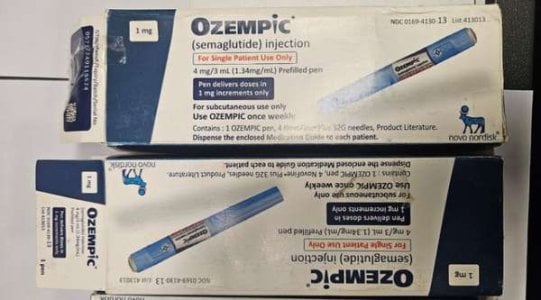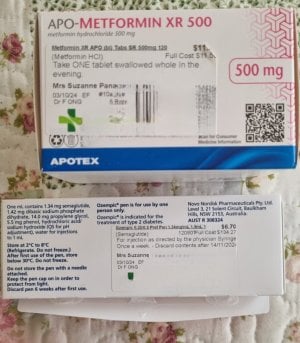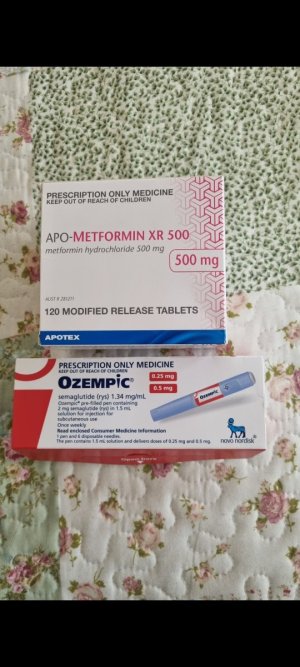Fake copies of this drug are everywhere. Here's how to spot them
By
Danielle F.
- Replies 11
The convenience of modern medicine is often taken for granted.
With a simple prescription, people can now manage supposedly life-threatening conditions.
However, reliance on medication also brought about a less talked about form of danger: counterfeit drugs.
The Therapeutic Goods Administration (TGA) has issued a public health alert after detecting counterfeit Ozempic pens spreading in Australia.
These fake pens, which have been relabelled as insulin pens, have already caused a life-threatening blood sugar level drop in at least one user.
Ozempic is a once-a-week injectable prescription medicine to regulate the blood sugar levels of type 2 diabetes patients.
Alongside diet and exercise, it also manages the risks of heart attacks and stroke.
Ozempic's active ingredient, semaglutide, would control insulin secretion from the pancreas and may suppress the brain's appetite receptors.
With these side effects, Ozempic has also been used as an unapproved weight loss drug.
The sudden surge in demand has caused a drop in supply levels, affecting type 2 diabetes patients.
The Ozempic shortage has paved the way for counterfeit alternatives to enter the market.
The TGA stated that all counterfeit products found so far appear to be relabelled insulin pens.
This could be dangerous if used, especially by someone expecting a dosage of semaglutide.
The pens are currently under laboratory testing, but until laboratories confirm their safety, they could be a severe health risk.
The TGA received a report of a life-threatening event related to the counterfeit drug.
Similar counterfeit products found overseas were also associated with adverse effects, including hospitalisation.
The reported counterfeit pens had a label with the batch number JS7A925 and were from overseas.
The Australian Border Force also detected counterfeit Ozempic-labelled pens imported into the country, labelled with batch number NPSG234.
These products were purchased online from an overseas website and imported under the personal importation scheme.
Ozempic manufacturer Novo Nordisk confirmed that these batch numbers are not genuine products.
Consumers and patients may identify fake Ozempic pens by checking some warning signs.
These include spelling errors, non-English instruction leaflets, unsealed packaging, and differences in size, shape, and appearance.
Genuine Ozempic pens should also have blue end caps instead of grey.
According to Novo Nordisk, Genuine Ozempic products will be in limited supply for the rest of the year.
This shortage is mainly due to the rapid increase in off-label prescriptions.
The Medicine Shortage Action Group (MSAG) also urged prescribers to avoid giving Ozempic to non-diabetic patients.
The MSAG also recommended using Wegovy, another semaglutide product specifically formulated for weight management.
It's crucial to stay informed about the medicine we use regularly.
Always purchase from legitimate sources like pharmacies, and consult with your healthcare provider if you have any concerns about your medication.

Have you seen any fake Ozempic pens in the flesh? What are your thoughts on this fake medicine issue? Share them with us in the comments section below.
With a simple prescription, people can now manage supposedly life-threatening conditions.
However, reliance on medication also brought about a less talked about form of danger: counterfeit drugs.
The Therapeutic Goods Administration (TGA) has issued a public health alert after detecting counterfeit Ozempic pens spreading in Australia.
These fake pens, which have been relabelled as insulin pens, have already caused a life-threatening blood sugar level drop in at least one user.
Ozempic is a once-a-week injectable prescription medicine to regulate the blood sugar levels of type 2 diabetes patients.
Alongside diet and exercise, it also manages the risks of heart attacks and stroke.
Ozempic's active ingredient, semaglutide, would control insulin secretion from the pancreas and may suppress the brain's appetite receptors.
With these side effects, Ozempic has also been used as an unapproved weight loss drug.
The sudden surge in demand has caused a drop in supply levels, affecting type 2 diabetes patients.
The Ozempic shortage has paved the way for counterfeit alternatives to enter the market.
The TGA stated that all counterfeit products found so far appear to be relabelled insulin pens.
This could be dangerous if used, especially by someone expecting a dosage of semaglutide.
The pens are currently under laboratory testing, but until laboratories confirm their safety, they could be a severe health risk.
The TGA received a report of a life-threatening event related to the counterfeit drug.
Similar counterfeit products found overseas were also associated with adverse effects, including hospitalisation.
The reported counterfeit pens had a label with the batch number JS7A925 and were from overseas.
The Australian Border Force also detected counterfeit Ozempic-labelled pens imported into the country, labelled with batch number NPSG234.
These products were purchased online from an overseas website and imported under the personal importation scheme.
Ozempic manufacturer Novo Nordisk confirmed that these batch numbers are not genuine products.
Consumers and patients may identify fake Ozempic pens by checking some warning signs.
These include spelling errors, non-English instruction leaflets, unsealed packaging, and differences in size, shape, and appearance.
Genuine Ozempic pens should also have blue end caps instead of grey.
According to Novo Nordisk, Genuine Ozempic products will be in limited supply for the rest of the year.
This shortage is mainly due to the rapid increase in off-label prescriptions.
The Medicine Shortage Action Group (MSAG) also urged prescribers to avoid giving Ozempic to non-diabetic patients.
The MSAG also recommended using Wegovy, another semaglutide product specifically formulated for weight management.
It's crucial to stay informed about the medicine we use regularly.
Always purchase from legitimate sources like pharmacies, and consult with your healthcare provider if you have any concerns about your medication.
Key Takeaways
- Counterfeit Ozempic pens have been detected in Australia, which led to one life-threatening incident.
- The Therapeutic Goods Administration (TGA) has issued a public health alert and provided warnings to help consumers identify the fake medicine.
- Genuine Ozempic has been limited in supply due to increased off-label use for weight loss.
- Consumers were urged to purchase medicines from legitimate sources and report any counterfeit products to the TGA or the authorities.










